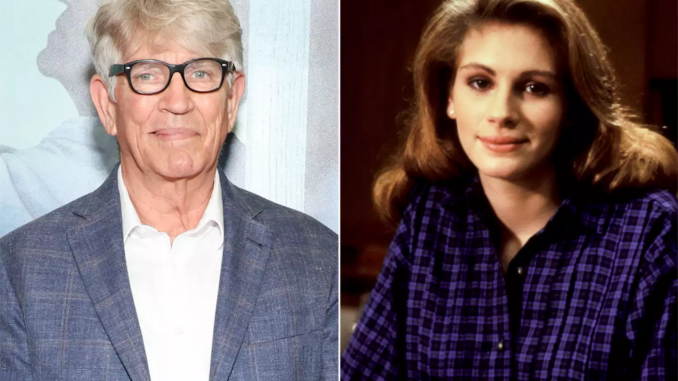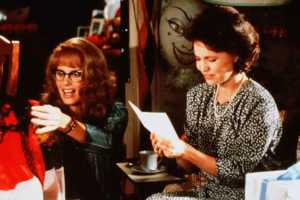
“They all chewed a lot of scenery, and we know that if an actor cries on film, they go to the top of the class. They get the Oscar nod because crying gets a lot of credit,” the actor wrote.
Eric Roberts is proud of his sister Julia Roberts, but he’s not a fan of one of her most acclaimed early movies.
In his memoir Runaway Train: Or the Story of My Life So Far, the prolific character actor offers his candid thoughts about 1989’s dramedy Steel Magnolias. “Julia was good in Mystic Pizza, great in Pretty Woman, but not so much in Steel Magnolias, in my opinion, even though it brought Julia her first Academy Award nomination,” he wrote. “I don’t want to sound like an actor talking, or a jealous sibling, but I don’t think her performance held up in that movie. When I saw her in Steel Magnolias, I thought, ‘Okay. Good. She’s almost a good actor, and one day she’s gonna be one.'”
Roberts doesn’t stop at criticizing his sister in the movie. “In fact, I think all those brilliant women — Sally Fields [sic], Dolly Parton, Olympia Dukakis, Shirley MacLaine, Daryl Hannah — overacted their asses off in Steel Magnolias,” he wrote. “Nobody’s great in that movie. They all chewed a lot of scenery, and we know that if an actor cries on film, they go to the top of the class. They get the Oscar nod because crying gets a lot of credit. It’s the big joke in all acting classes, even in the great Lee Strasberg’s Actors Studio. Crying and dying bring home the bacon!”
The actor thinks his superstar sister earned positive reviews for her performance because her real-life Southern roots made her a natural fit for her Louisianian character. “I also think another reason she got an Oscar nod for Steel Magnolias was her authenticity as a sweet, small-town Southern girl,” he wrote. “That’s what she was, after all, or at least that’s how she started off. I don’t know if she had a dialect coach try to eradicate her Southern accent, but if so, luckily for her it didn’t take.”
Roberts wrote that he thinks his family’s Southern heritage is a significant factor in Julia’s stardom. “I think that’s a big part of her appeal — along with her boffo good looks and killer smile — her Southern accent and mannerisms,” he wrote. “Beauty like that can be off-putting, especially for other women, but Julia’s down-home manner made her seem like your best friend. There’s a certain colorful and enchanting quality to Southern speech.”
Later in the same chapter of the book, Roberts reflected on how Pretty Woman launched his sister into another stratosphere of fame and acclaim. “Everyone loved that movie and Julia’s role in it,” he wrote. “I was working with George C. Scott (who’d won an Oscar for Patton in 1971) at the time, and he told me in his gruff voice that he thought her movie was going to go through the roof. It did. I watched it happen: Oh my god, Julia’s becoming a superstar!”
Roberts wrote that he was “not really” jealous of Julia’s success: “For one thing, we were never going to be up for the same parts.” However, he does admit that he was unprepared for the attention he faced as the older brother of America’s sweetheart. “When suddenly this rare and rarefied thing occurred, this worldwide phenomenon of Julia’s stardom, it shoved me into the public eye in a different way,” he wrote.
Some of that attention felt particularly inappropriate. “First, there were all kinds of suspicions cast upon us — even outlandish and creepy rumors of incest. I don’t exactly know where that started,” he wrote. “It could have been a dumb idea of what Southerners were capable of — a mean-spirited swipe at the South. But beyond that, it seemed as if there wasn’t room in the public imagination for both Julia and me — that we were in competition with each other.”
Roberts thinks Julia was upset with him for not taking her seriously during the height of her stardom. “When you rule the world, which she kind of did for a while, and a member of your family is slow to acknowledge that, you hold it against them,” he wrote. “I never paid enough homage to her. I still saw her as my baby sister, and I knew that she — like me — came from white trash, yet she became one of the biggest stars that ever breathed. And she knew it, bless her heart. What a trajectory!”
The character actor also noted that he doesn’t think he shares much in common with his sister as a performer. “Julia is a movie star and I’m an actor. There’s a difference,” he wrote. “That’s how people look at us, and that’s how I look at us, and I’m fine with that. When people ask me, ‘Do you have a problem with your sister’s success?’ I tell them no. We’ll never be up for the same part. I’m not waiting for her kind of paycheck, or stardom, or her help.”

Eric Roberts’ memoir Runaway Train: Or the Story of My Life So Far is available now.
